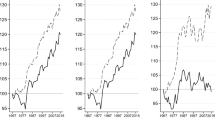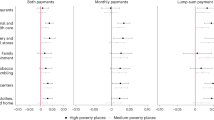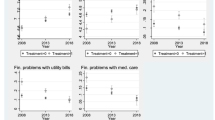Abstract
This article uses micro-level data from the Consumer Expenditure Survey (CEX) to study consumers’ spending responses to the child tax credit. The article provides one test of the permanent-income hypothesis (PIH) that infers that temporary changes in income have little effect on consumer spending, at the initiation of the child tax credit in 1997, and a second PIH test when the credit was increased in 2003. The evidence supports the PIH in both 1997 and 2003, even using three different proxies for liquidity-constrained households. Separate from any PIH implications, our findings suggest the child tax credit did not provide a short-term consumption stimulus in either of the time periods studied. Our results therefore cast some doubt on whether this type of tax credit should be considered sound fiscal policy.
Similar content being viewed by others
References
Agarwal S, Chunlin L, Nicholas S (2004) The reaction of consumer spending and debt to tax rebates—evidence from consumer credit data. J Polit Econ 115(6): 986–1019
Alegre J, Pou L (2008) Further evidence of excess sensitivity of consumption? nonseparability among goods and heterogeneity across households. Appl Econ 40(7): 931–948
Barrow L, McGranahan L (2001) The earned income tax credit and its impact on America’s families. In: Mayer , Holtz-Eakin (eds) Making work pay. Russell Sage Foundation, New York, pp 329–365
Coronado J, Lupton J, Sheiner L (2005) The household spending response to the 2003 tax cut: evidence from survey data. Finance and economics discussion series divisions of research and statistics and monetary affairs. Federal Reserve Board, Washington
Drobny A, Speight A (1986) Consumption and income: some simple exercises with panel data. Appl Econ 18(7): 757–775
Edwards R (2004) Macroeconomic implications of the earned income tax credit. Natl Tax J 57(1): 45–65
Ferrara P (2011) Reaganomics Vs. Obamanomics: fallacies offered by the left. forbes. http://www.forbes.com/sites/peterferrara/2011/05/12/reaganomics-vs-obamanomics-fallacies-offered-by-the-left/. Accessed 25 Aug 2011
Johnson D, Jonathan P, Nicholas S (2006) Household expenditure and the income tax rebates of 2001. Am Econ Rev 96(5): 1589–1610
Johnson D, Parker J, Nicholas S (2009) The response of consumer spending to rebates during an expansion: evidence from the 2003 child tax credit. Working paper
Lusardi A (1996) Permanent income, current income, and consumption: evidence from two panel data sets. J Bus Econ Stat 14(1): 81–90
Michel N (2010) Another look at the spending response to the 2001 income tax rebates. Appl Econ. doi:10.1080/00036840903427224
Mitchell D (2006) A supply-side success story. Copenhagen Institute. http://www.coin.dk/default.asp?aid=695. Accessed 25 Aug 2011
Parker J (1999) The reaction of household consumption to predictable changes in social security taxes. Am Econ Rev 89(4): 959–973
Shapiro M, Slemrod J (2003) Consumer response to tax rebates. Am Econ Rev 93(1): 381–396
Shapiro M, Slemrod J (2002) Did the 2001 tax rebate stimulate spending? Evidence from taxpayer surveys. NBER working paper no. 9308. National Bureau of Economic Research, Inc., Cambridge
Souleles N (2002) Consumer response to the reagan tax cuts. J Public Econ 85(1): 99–120
Author information
Authors and Affiliations
Corresponding author
Rights and permissions
About this article
Cite this article
Michel, N., Ahmad, N. Consumer response to child tax credit. Empir Econ 43, 1199–1214 (2012). https://doi.org/10.1007/s00181-011-0531-7
Received:
Accepted:
Published:
Issue Date:
DOI: https://doi.org/10.1007/s00181-011-0531-7




